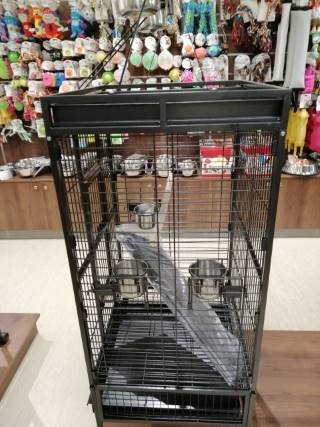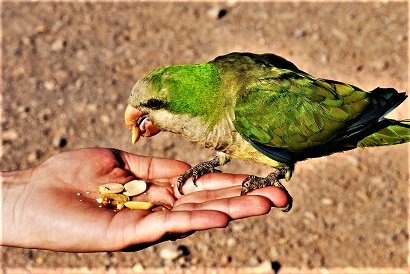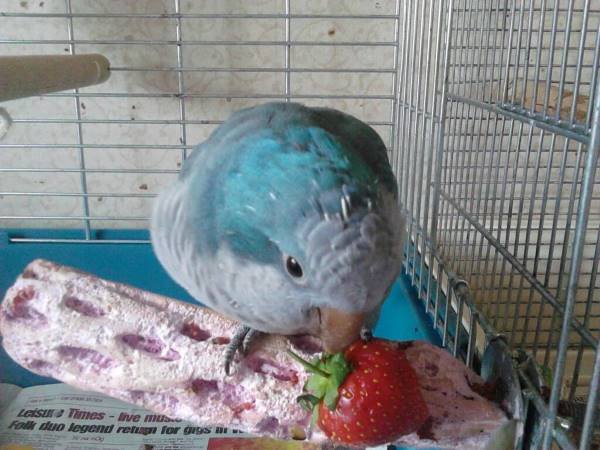Pets have always been great human companions. Once they have formed a bond with their owner, their loyalty is unmatchable. And all they want in return is little love and care of their favorite human. Some pets like Quaker parrots are flock birds and hence, take their bonds very seriously. If ignored, they succumb to depression due to their over-sensitive behavior. Hence taking care of them becomes all the more important at least to keep them from falling ill.
How to care for Quaker parrot?
Quakers are just like other four-legged pets; they need to be fed with a quality diet, their proper hygiene should be maintained, they need some playtime, and they need some of the owner’s time too. And while doing so, moderation is the key. If the owner couldn’t maintain a balance while maintaining Quaker’s routine, it might backfire.
So, making a set schedule and adhering to it is the best way to care for a Quaker. For the first time owners, having an avian pet can be overwhelming during the initial months. Hence, making a Quaker parrot care sheet can prove extremely helpful.
How to care for baby Quaker parrot?
If done properly, Quaker parrot baby care can ensure him growing up into a healthy adult Quaker. If the owner lags in the initial days and couldn’t make him used to the life he’s going to live, the bird might never adjust to a unique habitat anytime later. Here’s a list of all the things the owner must do religiously to keep the baby Quaker fit and fine:
- Get him a brooder box of wood or glass with a proper height to prevent him from jumping out of it and making him vulnerable to probable predators like cats.
- Insulate the box, especially from the base, to keep the bird warm all the time as young birds are sensitive to lower temperatures. Use a bird lamp to warm the box or keep heating pads beneath the surface.
- Hand-feed him with commercial bird mix as it has all the nutrients in a perfect balance. Do not overdo it as two meals per day of one to two tablespoons are enough to energize baby Quaker’s small body.
- Clean his brooder box daily as baby Quakers aren’t potty-trained and hence, there will be droppings and litter everywhere in the box. Not doing it daily might make the baby bird catch a bacterial or viral infection.
- Keep some small-sized, organic toys for the bird’s playtime. These toys aren’t the same as that of adult Quaker like wood toys. One can keep soft toys like organic cotton balls to let the baby Quaker play without risking himself.
- Take him to a reputed avian vet regularly to ensure that his body is adapting well to the new surroundings. This will ensure early arrest of any disease.
- Ensure his safety during his trip to the vet. Many Quaker owners tend to forget the fact that a baby Quaker might get injured while his outings as a bird who hasn’t yet adapted well to a new habitat. Keeping a traveling small-sized brooder box, similar to the one at home, is a great option.
- Lastly, spend some time with the bird as this will help in forging an unbreakable bond. A bond developed with Quaker during his initial days will stay etched on his mind all his life and he’ll be the best companion for his owner thereon.
How to care for adult Quaker parrot?
Taking care of an adult Quaker will be tougher if the owner has adopted the bird in adulthood only. But if the adopted Quaker has been a part of the family since his infancy, the bond developed during those initial few months are extremely helpful in Quaker parrot care and training.
Quaker Parrot Cage
With an adult Quaker parrot, taking care of his housing needs with his changing personality becomes the need of the hour. A grown-up Quaker can no longer live happily in a brooder. He’ll anyway keep flying out of the brooder box to find things for entertainment. Hence, providing him an appropriately sized cage with all the amenities is imperative. A cage of at least 18 inches in length and breadth and around 24 inches in height will be a perfect size for an adult Quaker. And the amenities include varying perches and toys, all made from organic material.

Quaker Parrot Training
After passing his infancy, a Quaker parrot races towards becoming an adult. Providing care for Quaker parrot while he is baby is always the focus for all the owners. No human companion stresses out to train him while he’s too young to eat his food. But after he has passed that extremely vulnerable phase, training him becomes an urgency so that he can learn ways of life early on.
- Introduce the dishes for food and water in his cage to make him habitual of eating and drinking from them regularly. Making him comfortable with his new habitat is an integral part of training him how to live inside the cage.
- Keep the cage at eye level so that when the owner looks at the bird or gets closer, he doesn’t perceive him as a threat.
- If the owner still likes to hand-feed the bird and notices a biting behavior due to the bird’s unbound energy, he must train the bird not to bite. The more the delay, the harder his bite will get. Clicking method works the best for most of the owners as it deviates the bird’s mind from bite to the click.
- After making him comfortable with a hand inside the cage, the next step is to train him to step-up on the hand. This is important when the owner wants to take the bird out of the cage for some time out. The bird knows how to come out without hurting himself.
- Train the bird for not pooping all around the cage has also proved to be a success for many owners.
- Training the bird for bathing in his bowl can be easily achieved by putting some sparkles in the water and making it a fun thing to do.
- Training the bird to preen his feathers regularly ensures his good hygiene, thereby, making it the most integral part of Quaker parrot pet care.
- Teaching him certain words with the help of the repetition method is the most successful speech training.
Read more about Quaker Training:
https://parrotquaker.com/how-to-train-a-quaker-parrot/
Quaker Parrot Diet
An adult Quaker parrot diet care is nothing like Quaker parrot care for baby food habits. Quaker parrot food and care are interdependent and one is incomplete without the other. Diet care for Quaker parrot includes giving him a balanced and nutrient-rich diet and it ranks on the top of any Quaker parrot care guide.
- Feed the bird with a perfect mix of pellets and seed mix. One can opt for high-quality branded mixes due to their balanced nutrient ratio.
- Give him all kinds of nuts, more often as a treat only.
- A daily dose of fresh fruits and green leafy vegetables is a must.
- Cuttlebone for calcium intake should be kept in his cage.
Quaker Parrot Health
A Quaker parrot care information would be incomplete without discussing his health. Knowing your Quaker parrot, how to take care of him, or spending time with him will ensure a healthy bird.
- Quakers are prone to obesity and hence, nuts should only be an occasional food.
- For the bird’s well-being, the owner must understand the fact that Quaker parrot care and personality are well-connected. A playful and social nature makes the bird demanding. All he wants is a lot of owner’s care and attention. Lack of it results in the biggest known Quaker health issue: feather plucking courtesy loneliness and depression.
- The bird’s environment should not have any hazardous or toxic materials like paints on toys, Teflon-coated heated cookware, smoke from cigarettes, or any such fumes.
- Quaker parrot beak care shouldn’t be ignored as his beak is just like his limb. To prevent beak issues, keep organic wood chewable in his cage.
- Annual visits to the vet for a full-body check-up would ensure early diagnosis of any probable disease and its cure thereof.
Wise Words
Keeping a Quaker as a pet works well for those willing to dedicate their time to him and this is the biggest Quaker parrot care act one can do. It doesn’t matter which color mutation one goes for, care is what all matters. A green Quaker parrot care or a blue Quaker parrot care has the same premise as that of caring for any feathery pet. The only difference would be made by adding the little Quaker to the family. The bird must be the center of the owner’s world just like the owner is, for the bird.





